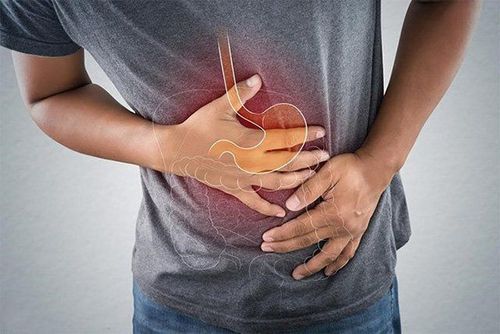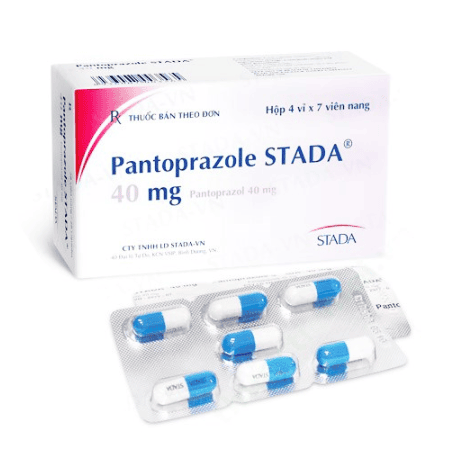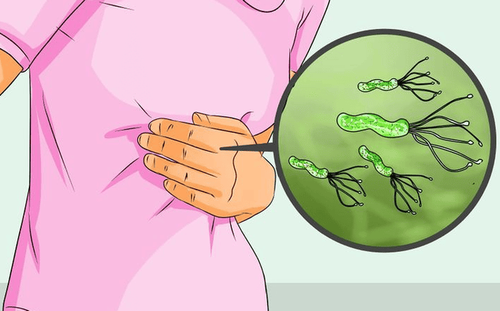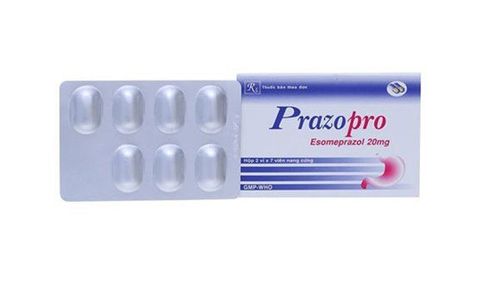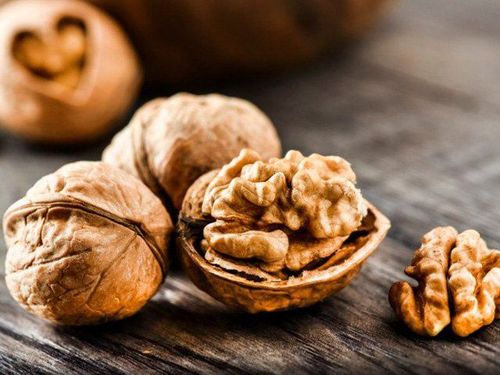This is an automatically translated article.
The article is professionally consulted by Master, Doctor Dang Xuan Cuong - Emergency Resuscitation Department - Vinmec Hai Phong International General Hospital. The doctor has 14 years of experience in the field of emergency resuscitation and poison control.The stomach is an organ that plays an important role in the digestion of food in the body. Among them, gastric juice is a product of the gastric glands that have a great effect in the metabolism of substances and digestion of food.
1. What is translation?
Gastric juice is a mixture of substances secreted by the gastric glands. On average, the stomach excretes 1-2.5 liters of gastric juice per day. Gastric juice is a clear, colorless liquid with two main components, hydrochloric acid (HCl) and the enzyme pepsin. Hydrochloric acid exists in gastric juice in two forms (free form and protein-conjugated form) with high concentration (about 150 mmol/liter, pH=1.5-2.5)Thanks to the enzyme pepsin, gastric juice helps to convert protein foods into long, continuous and unbranched peptide chains (Polypeptides) that are easier to digest. In addition, the mucus present in the gastric juice will wrap around the food, making it easier to transport food in the digestive organs.
Most of the gastric juice is secreted by glands located in the lining of the body and bottom of the stomach. Depending on the composition of secretions, these glands can be divided into 2 groups:
-Glands in the cardia and pylorus: the role of mucus secretion
-Glands in the renal region: are the main digestive glands of the stomach, Consists of 4 main cell types:
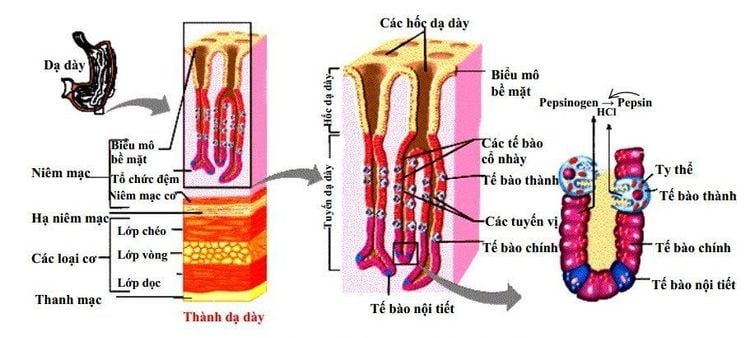
Vị trí tuyến vị trong dạ dày
2. Excretion and the role of digestive enzymes
The group of digestive enzymes in gastric juice includes:Pepsin: Has the effect of hydrolyzing proteins into Proteose, Peptone and Polypeptide. In addition, pepsin also has the ability to digest collagen, helping other digestive enzymes to penetrate meat and digest proteins. Pepsin digests 10-20% of feed protein and is most active at pH 2 to 3 and inactivated when pH > 5. Lipase gastric juice: Every day we absorb about 60 to 100g of lipids with the composition of which is 90% triglycerides, the rest is cholesterol esters, phospholipids and a few fat-soluble vitamins. Gastric lipase is a weak lipid-digesting enzyme that works in an acidic environment, which breaks down triglycerides already emulsified in food (milk, egg yolks) into glycerol and fatty acids. Fatty acids after being released in the stomach will stimulate the duodenal mucosa to secrete cholecystokinin hormone, which stimulates the pancreas to secrete lipase.

Cấu trúc tinh thể của lipase dạ dày ở người
3. Characteristics of gastric juice
Some common characteristics of gastric juice can be mentioned:Color: Gastric juice is usually transparent, colorless. In some cases, if the gastric juice is red like blood, it is usually due to trauma, bleeding, stomach cancer, varicose veins ... If it is dark brown like coffee grounds, it may be due to a problem in the stomach. secret. In general, when gastric juice has an abnormal color, biochemical tests should be performed to have a more specific diagnosis. Odor: Normally gastric juice will have a slightly pungent smell, so if the secretion of gastric juice has a bad and sour smell, it is likely due to pyloric stenosis; if the smell is strong like stool, it may be due to small bowel obstruction or fistula of the stomach or intestines; an ammonia smell likely due to uremia; Odorless cases are due to gastric acidosis. Volume: when fasting, the body will excrete gastric juice about 50ml/hour, if the secretion volume is more than about 250ml/hour, the possibility of pyloric stenosis, gastric hypersecretion. Mucus: mucus in gastric juice usually has a certain viscosity, if the mucus increases, it can be caused by swallowing saliva, viscous sputum from the oropharynx, inflammation or stagnation in the stomach.

Dịch vị dạ dày giàu tính axit
4. Stages of gastric secretion
The mechanism of regulating gastric secretion of gastric juice is divided into 3 stages:The first stage: is the stage that takes place before food enters the stomach, accounting for about 20% of the total gastric juice during the meal. When we smell, see, chew, swallow or even think about food, the gastric juices have already begun to be excreted. The more delicious the food, the more palatable the process of eating, the stronger the intensity of gastric secretion. The mechanism of gastric secretion at this stage is in the direction of unconditioned and conditioned reflexes. Both directions have transmission lines to the X cord. The psychological state when eating also clearly affects the secretion of gastric juice: angry, hostile mood increases secretion; fear, anxiety reduces excretion. - Gastric phase: When the food entering the stomach begins to be kneaded and digested, at this time, stimulating signals from the stomach will trigger X-wire reflexes, local reflexes and gastrin release, histamine. Both nervous and hormonal mechanisms work together to cause gastric juice to be secreted continuously as long as food is stored in the stomach. The amount of gastric juice secreted during this period accounts for 70% of the secretion of the whole meal. Intestinal phase: When food enters the small intestine, it tends to stretch the duodenum, while hydrochloric acid (HCl) and protein digestion products in the chyme will promote the duodenal mucosa to release a small amount of gastrin. Gastrin travels through the blood to stimulate the acid-producing glands of the stomach to secrete gastric juice. The amount of gastric juice secreted in the intestinal phase accounts for only about 10% of gastric juice excreted during the whole meal. These 3 stages combine smoothly to stimulate the secretion of gastric juice when food is ready to enter the stomach, stay in the stomach or enter the intestines.
Please dial HOTLINE for more information or register for an appointment HERE. Download MyVinmec app to make appointments faster and to manage your bookings easily.
Recommended video:
Periodic health check at Vinmec: Protect yourself before it's too late!





